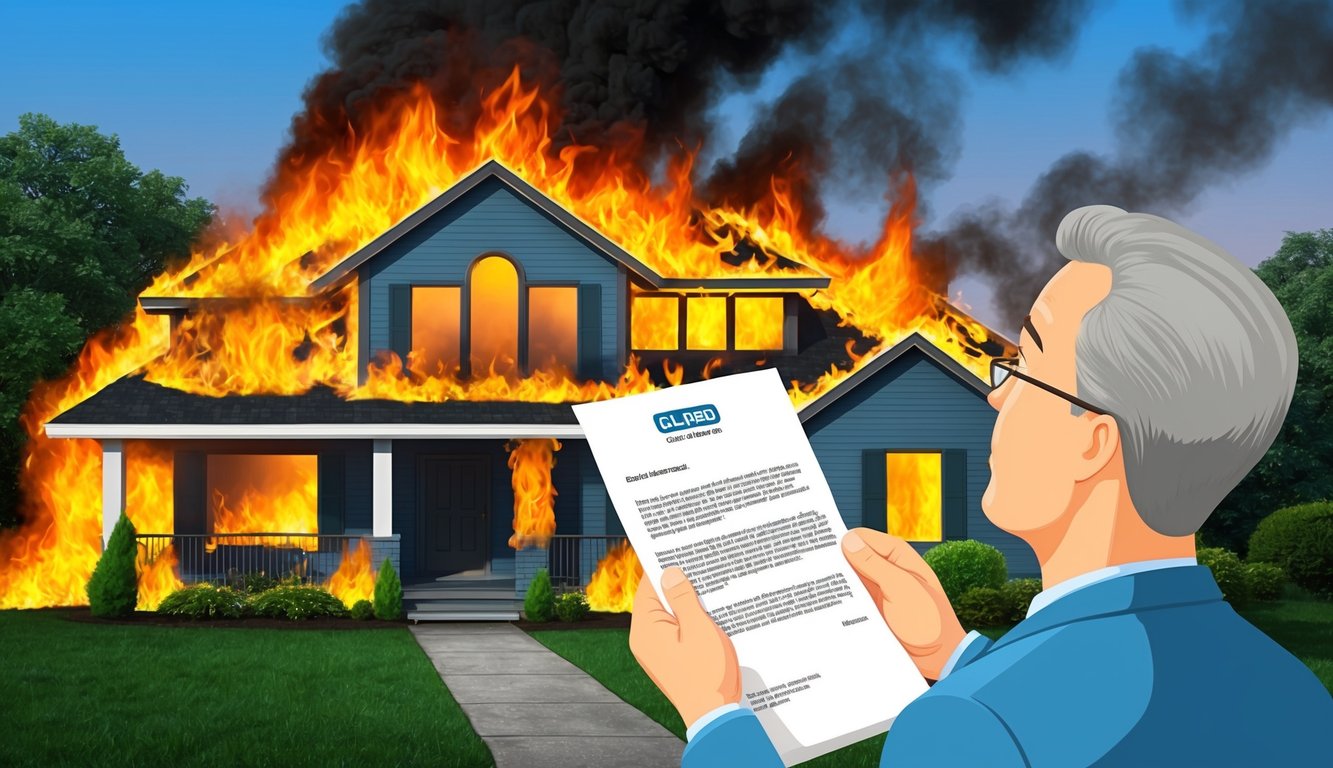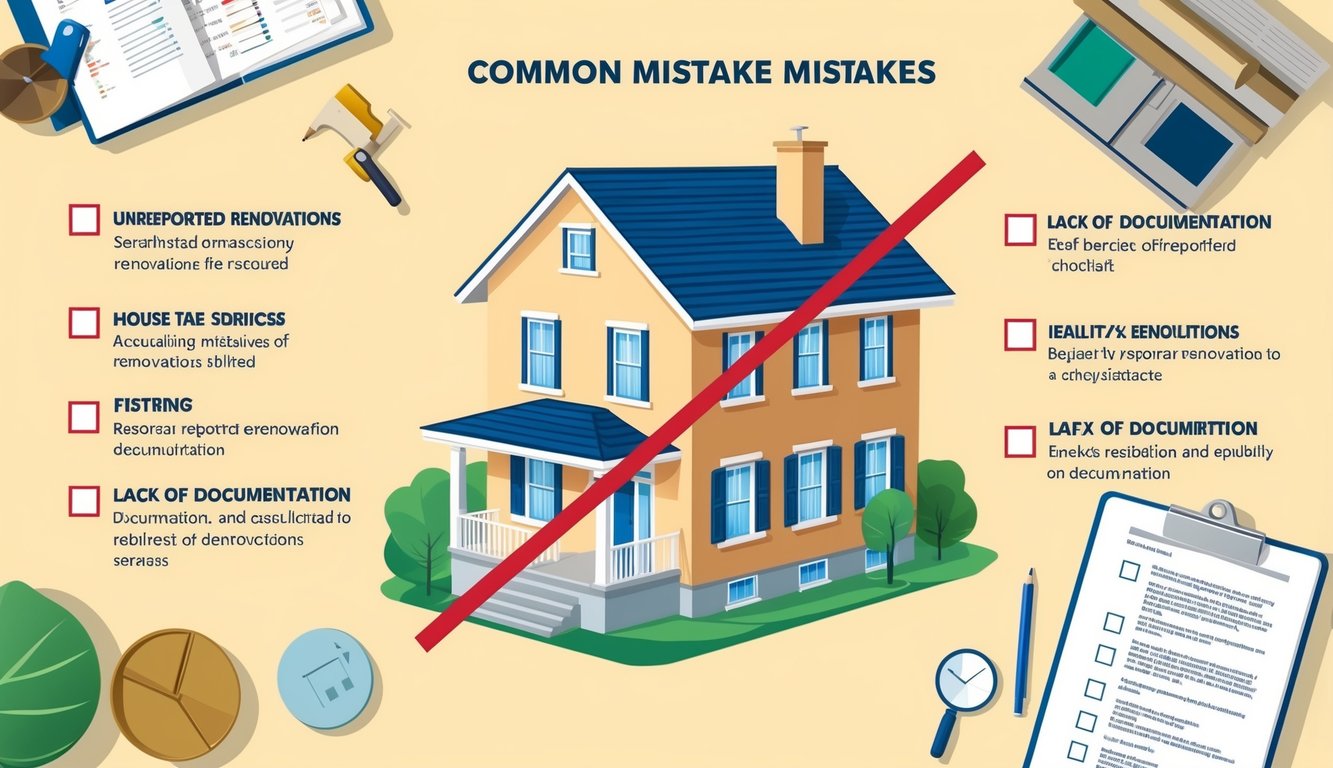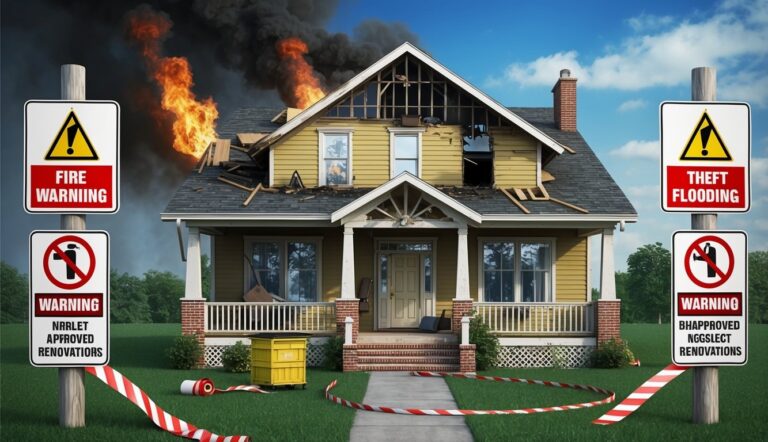Home insurance provides crucial protection for your property and belongings.
However, certain mistakes can jeopardize your coverage and leave you financially vulnerable when you need it most.
Understanding these potential pitfalls is essential for maintaining valid insurance protection.
Knowing the common errors that can void your home insurance claim can save you from significant financial distress. This knowledge empowers you to take proactive steps to ensure your policy remains effective and your claims are processed smoothly.
By avoiding these mistakes, you can maximize your insurance benefits and maintain peace of mind about your home’s protection.
1) Failing to Report Damage Immediately
Promptly reporting property damage is crucial for a successful home insurance claim. Waiting too long to file a claim is a huge mistake.
When you notice damage to your home, contact your insurance provider right away.
Delaying the reporting process can weaken your claim.
Insurance companies often have specific timeframes for claim submissions.
Failing to meet these deadlines may result in your claim being denied.
Prompt documentation and reporting of property damage are essential. The longer you wait, the harder it becomes to prove when and how the damage occurred.
This delay can raise suspicions and complicate the claims process.
Immediate reporting allows for quicker assessment of the damage.
This swift action can prevent further deterioration of your property.
It also demonstrates your commitment to mitigating losses, which insurers appreciate.
Remember, your policy likely requires timely notification of incidents.
By reporting damage promptly, you fulfill your contractual obligations.
This compliance helps maintain a positive relationship with your insurer.
Don’t hesitate to contact your insurance company, even if you’re unsure about the extent of the damage.
It’s better to inform them early and decide later whether to proceed with a formal claim.
2) Using Unlicensed Contractors for Repairs
Hiring unlicensed contractors for home repairs can put your insurance coverage at risk. Many homeowner insurance policies require you to use licensed professionals for work on your property.
Using an unlicensed contractor may void your insurance coverage for the specific project.
In some cases, it could even lead to the cancellation of your entire policy.
Licensed contractors typically carry their own insurance and bonds.
This protects you from liability if something goes wrong during the repair process.
Unlicensed workers often lack proper insurance.
If they get injured on your property, you could be held financially responsible for their medical bills and lost wages.
In many states, it’s illegal to hire unlicensed contractors for projects over a certain value.
For example, in California, using an unlicensed contractor for work exceeding $500 is against the law.
To protect your insurance coverage, always verify a contractor’s license before hiring them.
Ask to see their credentials and check with your state’s licensing board to confirm their status.
Remember, saving money by hiring an unlicensed contractor can cost you much more in the long run.
It’s not worth risking your insurance coverage and potentially facing legal issues.
3) Neglecting Regular Home Maintenance

Regular home maintenance is crucial for keeping your insurance coverage valid.
Many homeowners overlook the importance of routine upkeep, which can lead to serious consequences.
Failing to address small issues promptly can result in more significant problems down the line. Ignoring minor leaks or water stains may seem inconsequential, but these can escalate into major water damage if left unchecked.
Your HVAC system requires consistent attention.
Neglecting its maintenance can lead to inefficiency, higher energy bills, and potential system failures.
Regular servicing ensures your system operates optimally and helps prevent unexpected breakdowns.
Structural issues should never be ignored.
Cracks in walls, sagging roofs, or foundation problems need immediate attention.
Delaying repairs on these critical elements can compromise your home’s integrity and safety.
Gutters and downspouts play a vital role in protecting your home from water damage.
Keeping them clean and in good condition prevents water from seeping into your home’s foundation or walls.
Neglecting regular maintenance tasks can void your insurance if damages occur as a result.
Insurance companies expect you to maintain your property in good condition.
By staying on top of home maintenance, you not only protect your investment but also ensure your insurance coverage remains valid.
Regular inspections and prompt repairs can save you from costly damages and potential insurance claim denials in the future.
4) Misrepresenting Facts on Your Claim

When filing an insurance claim, providing accurate information is crucial.
Misrepresenting facts, whether intentionally or accidentally, can lead to serious consequences.
Insurance companies take misrepresentation very seriously.
Even small inaccuracies can be grounds for denying your claim or canceling your policy.
Be careful when describing the circumstances of the incident.
Exaggerating damage or including pre-existing issues can be considered fraudulent.
Keep detailed records of your possessions and their value. Taking an inventory of your belongings can help you provide accurate information when filing a claim.
If you’re unsure about any details, it’s better to say you don’t know than to guess.
Insurance companies may investigate claim circumstances to verify the information you provide.
Remember that your insurance contract is based on good faith.
Providing false information breaches this agreement and can have legal repercussions.
If you realize you’ve made a mistake in your claim, inform your insurer immediately.
Being proactive can help prevent accusations of intentional misrepresentation.
Always review your claim carefully before submitting.
Double-check dates, values, and descriptions to ensure everything is accurate.
5) Not Keeping Proof of Ownership for Valuables
Failing to maintain proper documentation for your valuable possessions can significantly impact your home insurance claim.
Insurance companies require evidence to verify the ownership and value of items you’re claiming.
Keep detailed records of your valuable belongings.
This includes receipts, appraisals, and photographs.
These documents serve as crucial proof when filing a claim for lost, stolen, or damaged items.
Take an inventory of your belongings regularly.
Update this list whenever you acquire new furnishings, electronics, or collections.
This practice ensures your records remain current and accurate.
For high-value items like jewelry, artwork, or antiques, consider obtaining separate endorsements or riders.
These additional coverages often require professional appraisals, which also serve as proof of ownership and value.
Store your documentation securely.
Keep digital copies in cloud storage and physical copies in a fireproof safe or safety deposit box.
This precaution ensures your proof of ownership survives potential home disasters.
Without proper documentation, you risk having your claim denied or receiving less compensation than expected.
Insurance providers may question the existence or value of items you’re claiming without supporting evidence.
Remember to photograph or video record your home’s contents periodically.
This visual evidence can be invaluable in supporting your claims and refreshing your memory about your possessions.
Understanding Home Insurance Policies

Home insurance policies are complex documents that outline your coverage and responsibilities.
Knowing the types of coverage included and excluded in your policy is crucial for protecting your home and belongings.
Coverage Types
Standard home insurance policies typically include several key types of coverage.
Dwelling coverage protects the structure of your home from covered perils.
Personal property coverage safeguards your belongings.
Liability protection covers you if someone is injured on your property.
Additional living expenses coverage helps with costs if you’re displaced from your home due to a covered event.
Some policies offer optional endorsements for valuables like jewelry or artwork.
Review your policy carefully to understand what’s covered and consider adding riders for high-value items.
Policy Exclusions
It’s equally important to know what your policy doesn’t cover.
Most standard policies exclude damage from floods, earthquakes, and normal wear and tear.
Running a home business without informing your insurer can void coverage.
Certain dog breeds or exotic pets may also be excluded.
Neglecting home maintenance or leaving your home vacant for extended periods can lead to claim denials.
Be aware of specific exclusions in your policy and consider additional coverage for these risks if needed.
Common Errors in Filing Claims
Filing a home insurance claim can be complex.
Avoiding key mistakes is crucial for a successful outcome.
Providing Incomplete Information
When filing a claim, accuracy and completeness are essential. Failing to provide detailed information about the incident or damage can lead to delays or denials.
Document everything thoroughly.
Take photos and videos of the damage from multiple angles.
Make a list of all affected items, including their value and purchase dates.
Don’t forget to include relevant receipts, repair estimates, and police reports if applicable.
Providing a comprehensive account helps the insurance company assess your claim accurately.
Be prepared to answer follow-up questions from your insurer.
Prompt and thorough responses can speed up the claims process.
Missing Deadlines
Time is critical when it comes to insurance claims. Many policies have specific timeframes for reporting incidents and submitting claims.
Failing to meet these deadlines can result in claim denial.
Report the incident to your insurance company as soon as possible, even if you’re unsure about filing a claim.
This initial report starts the clock and protects your right to file later if needed.
Be aware of any deadlines for submitting supporting documentation.
Mark these dates on your calendar and set reminders to ensure you don’t miss them.
If you need more time, communicate with your insurer.
They may grant extensions in certain circumstances, but don’t assume this without asking.
Steps to Prevent Claim Denial

Taking proactive measures can significantly increase the chances of your home insurance claim being approved.
By focusing on documentation and understanding your policy, you can avoid common pitfalls that lead to claim denials.
Maintaining Accurate Documentation
Keep detailed records of all home improvements and repairs.
Make sure to take photos or videos of your property regularly, especially after making any changes.
Also, store receipts for valuable items and home upgrades in a safe place.
Create a home inventory list.
Include descriptions, purchase dates, and estimated values of your belongings.
Then, update this list annually or whenever you acquire new items.
In case of damage, document the incident thoroughly.
Take pictures of the damage immediately.
Also, keep a log of all communications with your insurance company, including dates, times, and names of representatives you speak with.
Understanding Policy Requirements
Read your insurance policy carefully.
Pay special attention to coverage limits, deductibles, and exclusions.
If anything is unclear, contact your insurance agent for clarification.
Be aware of time limits for filing claims.
Many policies require claims to be filed within a specific timeframe after an incident occurs.
Mark these deadlines on your calendar to ensure you don’t miss them.
Fulfill all maintenance obligations outlined in your policy.
Regular upkeep can prevent claim denials based on negligence.
Keep records of all maintenance activities to prove you’ve met these requirements.






